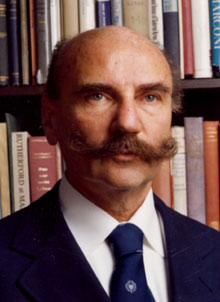
Charles Susskind, UC Berkeley professor emeritus and co-founder of campus bioengineering program, dies at 82 BERKELEY – Charles Susskind, professor emeritus of electrical engineering and a co-founder of bioengineering studies at the University of California, Berkeley, has died at the age of 82. Susskind died June 15 at his home in Berkeley after a long battle with Alzheimer's disease.
Early in his academic career, Susskind's research focused on the generation and transmission of microwaves. By the early 1960s, he had become interested in the interaction of microwaves with biological tissues. "He recognized early on the importance of studying biological and health effects of microwaves and electromagnetic fields long before it became of general public interest," said Martin Graham, UC Berkeley professor emeritus of electrical engineering. Susskind's work on the intersection of engineering with biological sciences became a driving force for his advocacy of a bioengineering program at UC Berkeley. Working with Irving Fatt, at the time a UC Berkeley professor of mechanical engineering, Susskind organized the campus's first bioengineering graduate training program and later helped expand it to an undergraduate curriculum. Their efforts formed the foundation for the Joint UC Berkeley/UC San Francisco Graduate Group in Bioengineering in 1982, and the Department of Bioengineering in 1999. "Susskind and Fatt were the founding fathers of Berkeley's current academic programs in bioengineering," said Edwin Lewis, professor emeritus of electrical engineering. "He (Susskind) was a vital participant during the coming of age of bioengineering at Berkeley." Born in Prague, now the Czech Republic, on August 19, 1921, Susskind had his sights set on the United States at a young age. He applied for U.S. immigration in 1938 when he was 16, but was told he would have to wait two years. One year later, the Nazis occupied Czechoslovakia, and his father died from a medical condition, prompting Susskind and his older brother, Walter, to flee to England. Although he could not speak English at the time, he would later become fluent in English, French and German, in addition to his native Czech. In London, after World War II broke out, Susskind joined the U.S. Army as a radar specialist for the Air Corps, the precursor to the U.S. Air Force. While in England, Susskind met his wife, Teresa, who was working as a code-breaker with the Women's Royal Naval Service. They would always remember May 1, 1945-the day they got married. "When we stepped out after our wedding, we saw a newspaper stand with headlines that Hitler was dead," said Teresa Susskind. "Hitler had shot himself on April 30. Charles said that was the best wedding present he could ever get." After the war ended, Susskind and his wife moved to the United States and became U.S. citizens. He earned his bachelor's degree in electrical engineering at the California Institute of Technology in 1948, and his Ph.D. in electrical engineering at Yale University in 1951. He returned to California and spent the next four years at Stanford University as a research associate and lecturer before joining the UC Berkeley faculty as an assistant professor in electrical engineering in 1955. His keen interest in the historical context of technology's rise in the 20th century greatly influenced his writings. His numerous books covered the lives of such influential inventors as Heinrich Rudolf Hertz, Nikola Tesla and Guglielmo Marconi. His writings and talks also reflected his interest in the biological effects of exposure to electromagnetic fields. His concern with the role of technology in society led him to propose an engineer's version of the Hippocratic Oath in one of his books, "Understanding Technology." Engineers swearing by the oath would promise, among other things, not to use their professional knowledge contrary to the laws of humanity and to avoid waste and consumption of nonrenewable resources. The book has been translated into seven languages since it was first released in 1968. Susskind and his wife founded San Francisco Press in 1959, and he served as the editor-in-chief for "Encyclopedia of Electronics," published by McGraw-Hill. Susskind served as assistant dean of UC Berkeley's College of Engineering from 1964 to 1968. In 1969, he took a position at the UC Office of the President as coordinator of academic affairs for all UC campuses. In 1985, he became chairman of the U.S. Environmental Protection Agency's presidential scientific advisory committee. In 1974, he returned to teaching at UC Berkeley. He remained active after his retirement in 1991, presenting a keynote address on the history of radar in 1995 at the International Telecommunications Conference. Among the many honors Susskind earned were a Fulbright Scholarship in 1961, a National Science Foundation Senior Faculty Fellowship in 1968, and numerous awards from the Institute of Electrical and Electronics Engineers. Throughout his life, Susskind kept alive the love of music instilled in him by his family. His mother, who had survived Nazi concentration camps, including Auschwitz, was a pianist. His brother, Walter Susskind, became a world-renowned conductor, most notably for the St. Louis Symphony. Colleagues recalled tales of Charles Susskind, who played cello, writing newspaper reviews of the San Francisco Symphony on a typewriter in the back seat of his car while his wife drove home from a performance. He subscribed to the San Francisco Opera and the San Francisco Symphony for nearly 50 years. Susskind is survived by his wife, Teresa, of Berkeley; daughters, Pamela Pettler and Amanda Susskind, both of Los Angeles; son, Peter Susskind, of Kensington; and two grandsons. Memorial services are pending.
|
